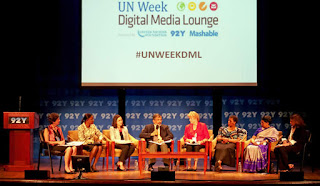A seemingly limitless supply of facts and figures about the state of the Millennium Development Goals (MDG's) can be found from a myriad of global health organizations by performing a quick internet search, yet many of us do not have the chance to witness or interact with the lives those numbers represent, to know what the lack of access means to them. Experts from India, Iraq, the United Kingdom and others underscored the need to address the whole picture of girls’ and women’s lives through access to education, family planning, and jobs rather than providing only medical assistance. MDG's 4, 5 and 6 will only be achieved they said, if girls and women have hope. Zainab Salbi, Founder of Women for Women International, said that girls and women must have “…hope in humanity,” and asked, “How do we restore that hope? How do we keep it alive?” Kimberly Perry, director of Girl Up, suggested new methods to inspire hope through peer group connections such as teenage girls in American connecting with teenage girls in Tanzania. These women argued that hope will be the driving force behind successfully achieving MDG's 4, 5 and 6. They said something needs to be done now, not tomorrow, next week or next year, and aid efforts should be targeted towards linking services to underserved populations.
Estimates from global health organizations such as UNICEF and Save the Children state that between fifteen and sixteen million women and children under five years of age could be saved between now and 2015 if MDG's 4, 5, and 6 are achieved. Today, leaders from major donor countries (USA, UK, and Australia) as well as Melinda Gates from the Bill and Melinda Gates Foundation agreed with the panelists here at the 92|Y; something must be done now. They collectively pledged over $5billion dollars over the next five years to specifically address maternal and child health.
The Yale Global Health Leadership Institute works directly on maternal, newborn and child issues through the Ethiopian Millennium Rural Initiative (EMRI) The EMRI initiative is a health system strengthening initiative implemented by the Clinton Health Access Initiative (CHAI) in rural Ethiopia. Yale tracks indicators relating to childhood immunizations (measles and pentavalent 3) in addition to indicators on institutional delivery and childhood nutrition in its evaluation of the EMRI program.
Gabe Forrey, GHLI Project Manager
